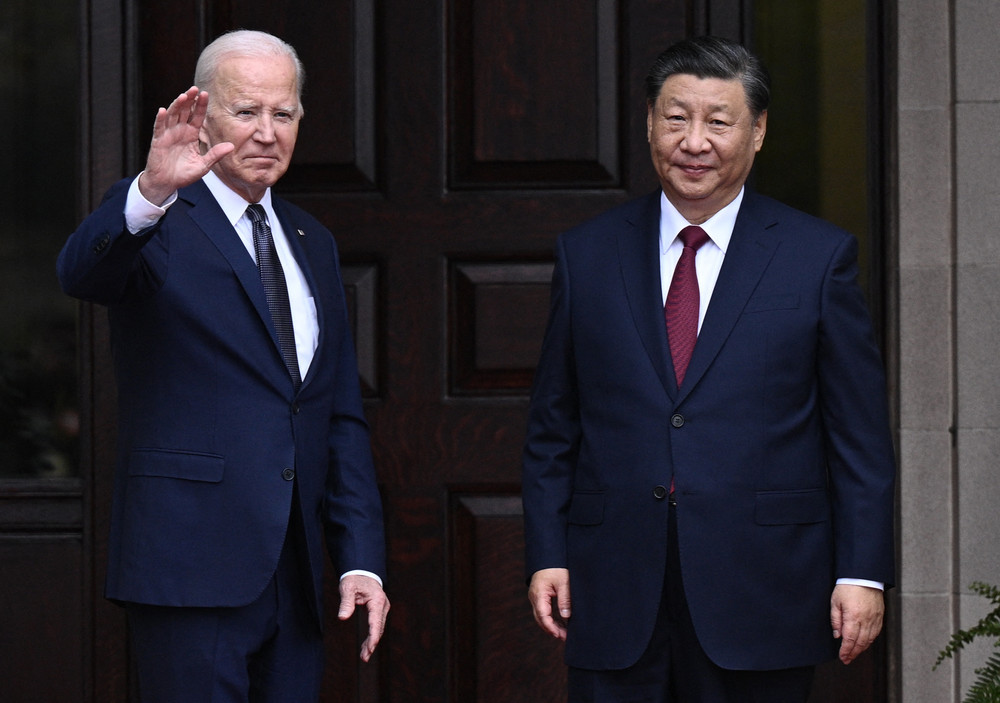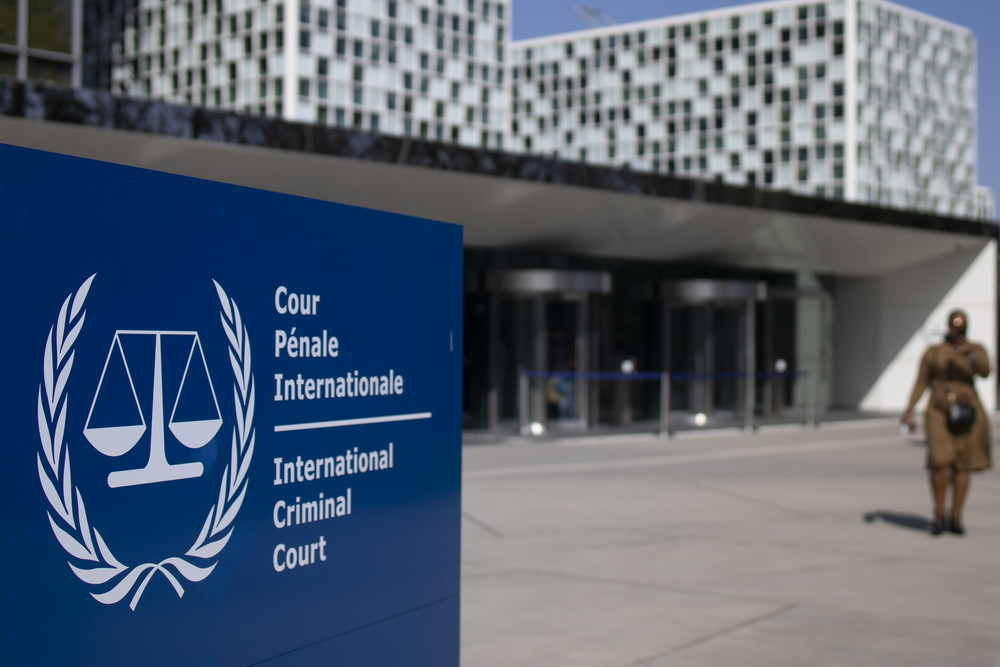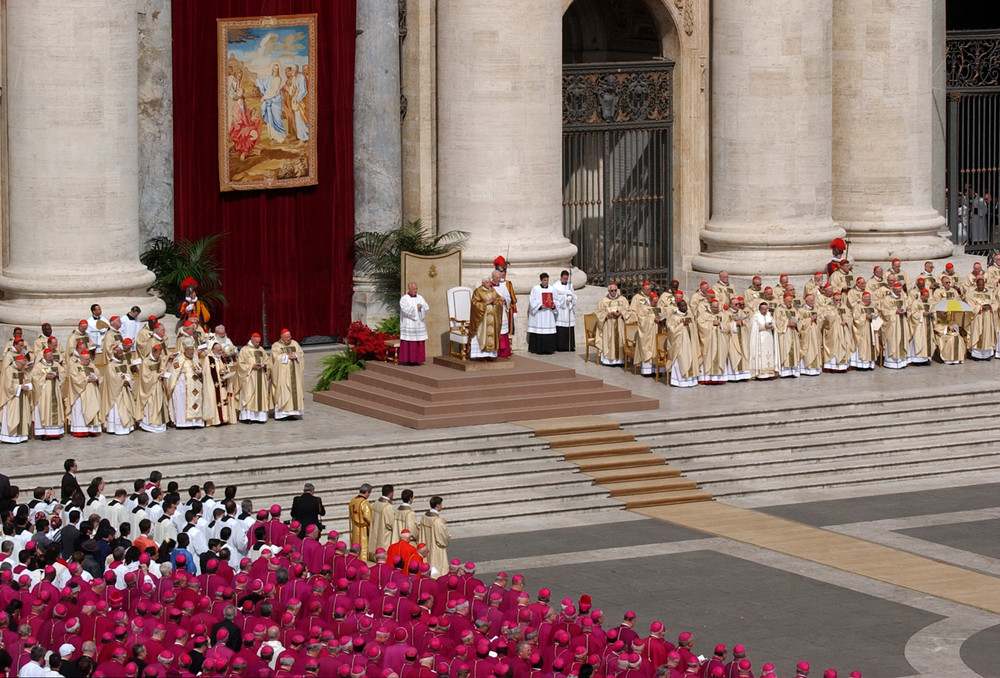 | BY GAVIN BADE | | 
President Joe Biden greets Chinese President Xi Jinping before their meeting during the Asia-Pacific Economic Cooperation summit outside of San Francisco on Nov. 15, 2023. | Brendan Smialowski/AFP via Getty Images | THE WHITE HOUSE STRIKES BACK — Since the start of the year, President Joe Biden and his team stayed mum while former President Donald Trump and his acolytes floated ever-more-radical plans on global trade. Trump’s 10 percent tariff proposal was reported without an official response for months. So, too, his plan to hike tariffs on China to 60 percent or more. But now it seems the former president has finally touched a nerve. Last week, POLITICO reported that Trump’s economic advisers are actively planning to lower the value of the dollar to boost exports and reduce the trade deficit. Trump himself drove the point home this week when he posted on social media that the surging strength of the dollar is a “total disaster” for the country. Though the Biden administration has kept key elements of Trump’s first term trade policies intact — including his tariffs on China — the plans to weaken the currency were enough to get the campaign’s attention. “What Trump and his allies are proposing would bring chaos to economic markets, raise costs on working families, and send inflation skyrocketing,” said Biden campaign spokesperson James Singer, calling it “thoughtless bluster that hurts working families and weakens our economy.” The statement is one of the first from the Biden camp attacking Trump’s aggressively protectionist trade agenda in the 2024 campaign, after the president briefly mentioned Trump’s tariff plans in a speech to the United Steelworkers in Pittsburgh last week. The statements highlight a new focus on international trade policy as the presidential campaign kicks into high gear — not just in rhetoric, but policy as well. In recent weeks, Biden has called for higher tariffs on Chinese steel and aluminum, directed the opening of a new tariff investigation on Chinese ships and publicly opposed the sale of U.S. Steel to a Japanese rival — all actions squarely aimed at Midwestern industrial voters that he highlighted in the Pittsburgh speech. Those actions have come after the administration took cues from at-risk Senate Democrats from the region — namely, Sens. Sherrod Brown of Ohio, Tammy Baldwin of Wisconsin and Bob Casey of Pennsylvania, all of whom face stiff reelection challenges this year. Those moves are aimed squarely at Trump talking points — in particular, that Biden’s clean energy subsidies will benefit Chinese firms over American ones. Administration veterans say that’s a conscious decision from Biden’s team. The White House’s rhetoric and actions are “all about the election,” said one former Biden administration trade official, granted anonymity to discuss internal thinking. “Trade animated [the election] in 2016, animated [it] in 2020, so it’s going to animate this election, too.” Trump’s allies say Biden is miscalculating, and that Rust Belt voters will side with the Republicans’ more populist economic plans, as they did in 2016.
WOW! OHIO: YOU ELECTED THIS CLOWN? “‘Devaluing’ [the dollar], of course, is a scary word, but what it really means is American exports become cheaper, and that’s important,” said Sen. J.D. Vance (R-Ohio), one of Trump’s most steadfast allies in the Senate. “If you want to employ a lot of people in manufacturing, you need to make it easier for us to export and not just import what we need.” Biden’s team will soon have a chance to take its trade offensive to new ground. The administration is close to finishing its review of Trump-era tariffs on China. That review could result in higher tariffs on steel and aluminum — which Biden previewed in Pittsburgh — as well as electric vehicles and other elements of the clean energy supply chain. Last week, Biden’s trade chief Katherine Tai assured lawmakers that the review would be done “soon.” Welcome to POLITICO Nightly. Reach out with news, tips and ideas at nightly@politico.com . Or contact tonight’s author at gbade@politico.com or on X (formerly known as Twitter) at @GavinBade .
| |
| | THE GOLD STANDARD OF POLICY REPORTING & INTELLIGENCE: POLITICO has more than 500 journalists delivering unrivaled reporting and illuminating the policy and regulatory landscape for those who need to know what’s next. Throughout the election and the legislative and regulatory pushes that will follow, POLITICO Pro is indispensable to those who need to make informed decisions fast. The Pro platform dives deeper into critical and quickly evolving sectors and industries—finance, defense, technology, healthcare, energy—equipping policymakers and those who shape legislation and regulation with essential news and intelligence from the world’s best politics and policy journalists.
Our newsroom is deeper, more experienced, and better sourced than any other—with teams embedded in the world’s most active legislative and regulatory power centers. From Brussels to Washington, New York to London, Sacramento to Paris, we bring subscribers inside the conversations that determine policy outcomes and the future of industries, providing insight that cannot be found anywhere else. Get the premier news and policy intelligence service, SUBSCRIBE TO POLITICO PRO TODAY . | | | | | | | DAY OFF IN MANHATTAN — Just like last week, the Trump trial in Manhattan paused on a Wednesday; it’s commonplace for a trial to go four days a week, as the trial judge uses the other weekday to take care of other pressing matters outside the case. IMMUNITY ARGUMENTS — This week at the Supreme Court, a simple question will sound difficult: Can a former president be criminally prosecuted if he tried to steal a presidential election through a campaign of lies and political bullying that apparently violated multiple federal criminal laws? That is the question the justices have chosen to confront on Thursday , when they hear oral argument in Trump’s pretrial appeal from the Justice Department’s prosecution in Washington. The outcome will undeniably shape the 2024 election. Some commentators have insisted that the issues aren’t simple, that they are sprawling and complicated, and that the court must grapple with the implications of its ruling in this case for future presidents to come. Legal framing is often a deliberate choice. The court can — and should — have resolved this issue narrowly and quickly. But instead, the justices chose to hear arguments, a decision that already has imperiled — possibly fatally — the prospect of a trial for Trump on Jan. 6 charges before Election Day. Even if Trump ultimately loses at the high court, that delay may already have provided him with a de facto form of immunity, since he could easily escape judgment before the election. And if he wins reelection, it will have been as good as a get-out-of-jail-free card.
| | — Biden signed a bill that could ban TikTok: President Joe Biden signed a bill today forcing TikTok to find a new owner within a year or face a ban — setting the course for what’s likely to be a drawn-out legal battle with potential political costs for the president. His endorsement capped a nearly four-year effort spanning two administrations to cut off China’s access to the video app used by 170 million Americans. The Senate voted Tuesday to pass the TikTok bill as part of a broader foreign aid package for Ukraine, Israel and Taiwan. — Biden administration makes it easier for flyers to get refunds: Passengers whose flights are canceled or “significantly” delayed won’t have to fight to get a cash refund from the airline under a new Biden administration rule issued today. The rule comes after more than a year of promises by the administration to shore up protections for air passengers, who have suffered through a glut of delays, cancellations and other gridlock as aviation demand surged after the pandemic. Under the new rule, airlines can’t simply give the passengers a voucher for a future flight.
REPUBLICANS SUPPORTING ISRAEL'S GENOCIDE
AND FUELING PROTESTS! — Johnson calls on the president of Columbia University to resign: Speaker Mike Johnson called for Columbia University President Minouche Shafik to resign amid a wave of protests on the Upper Manhattan Ivy League campus. Johnson’s comments to The Hugh Hewitt Show this morning make him the most senior elected official to demand the president’s resignation, and he’s slated to visit the campus in the afternoon. It’s another sign Republicans are looking to impose federal consequences on prominent universities that have seen waves of protests related to the fallout from the war in Gaza. — New Jersey Rep. Donald Payne Jr. dies: Donald M. Payne Jr., a member of a prominent Democratic Newark political family who represented the city and nearby communities in Congress for over 11 years, died today following a heart attack brought on by complications from diabetes , his office said. Payne, 65, entered Congress somewhat reluctantly in 2012 following the death of his father, Rep. Donald Payne Sr., who was the first Black person elected to Congress in New Jersey and who became one of the city’s luminaries during his more than two decades in Congress.
| | BY ANY APP NECESSARY — Joe Biden’s reelection campaign plans to continue using TikTok for at least the next year , despite the president signing a law today that would ban the social media platform nationwide if its China-based parent company doesn’t sell it in that timeframe, writes NBC News. The Biden campaign says it plans to use “every tool we have to reach young voters where they are” and has pledged to keep using “enhanced security measures.” The statement comes one day after his campaign declined to comment on whether it would continue using TikTok, prior to the bill’s final passage. THE ZOMBIE VOTE — Even after Nikki Haley dropped out of the Republican presidential primary, effectively handing the party’s nomination to former President Donald J. Trump, nearly 20 percent of G.O.P. primary voters have cast ballots for someone other than Trump . The Pennsylvania primary on Tuesday, where Ms. Haley won more than 16 percent, was just the latest example, reports the New York Times. These anti-Trump votes have been closely watched, particularly in light of the unusually high number of votes for “uncommitted” and candidates other than President Biden in this year’s Democratic primary. Ballots cast for candidates who have suspended their campaigns are sometimes called zombie votes. This phenomenon is hardly new. In fact, a review of contested primaries since 2000 reveals that sizable shares of the electorate routinely chose someone other than the eventual nominee, even after all other serious contenders had dropped out.
| | | 
The exterior view of the International Criminal Court is pictured in The Hague, Netherlands, on March 31, 2021. | Peter Dejong/AP Photo | PULLING THE STRINGS — Nicaragua’s case against Germany at the International Court of Justice (ICJ), in which the Central American country accuses Berlin of facilitating a “genocide” in Gaza, likely came at the behest of Russia , Western intelligence officials and diplomats told POLITICO. A detailed western intelligence assessment presented to POLITICO determined that Russia, which has close relations with Nicaragua’s authoritarian leaders, likely pushed their allies in Managua to use the so-called Genocide Convention of 1948 to pursue Germany at the ICJ. The Nicaraguans “have no reason to inject themselves into a conflict over the Middle East,” one of the western intelligence officers said. SPY GAMES — Far-right German MEP Maximilian Krah refused to quit the European election race today, despite allegations that his top aide was spying for China . Krah, from the Alternative for Germany (AfD) party, announced in Berlin that he would fire the assistant accused of espionage and not attend his party’s election campaign kickoff this weekend, as discussed with AfD leadership. But he’s not exiting the scene permanently, with the European election just six weeks away. The AfD is currently polling in second place in Germany, but has been hit by a series of scandals in recent months, culminating in the arrest Tuesday of Krah’s aide Jian G. who authorities said was an “employee of a Chinese secret service.” BRITAIN’S MESSAGE TO TRUMP — It began with a private dinner at Mar-a-Lago. U.K. Foreign Secretary David Cameron’s surprise visit to see Donald Trump at his Florida resort earlier this month was the start of a wider British effort to curry favor with the Republican U.S. presidential nominee . Cameron’s familiar Etonian drawl had been deployed by U.K. Prime Minister Rishi Sunak specifically to try to win Trump’s ear on the crucial issues of Ukraine and NATO. But it was Sunak’s big defense spending announcement in Poland on Tuesday — a display of military fiscal firepower over smooth-talking diplomacy — which Britain hopes will have made the greater impression. Sunak — in arguably his most consequential moment as prime minister — announced a £75 billion ($93.5 billion) increase in defense spending over the next six years as he vowed to maintain Britain’s place as Europe’s largest military power. Trump, broadly polling neck-and-neck with President Joe Biden, has consistently suggested he could drag America away from NATO and leave Europe to defend Ukraine alone if Western allies fail to pull their weight. Speaking in Warsaw, Sunak said it was important to show the U.S. that Europe understands this is “not the moment for complacency,” in remarks clearly aimed at the former president. TRANSATLANTIC TROUBLE — Trump’s return to the White House is no sure thing, but the possibility is forcing Europe’s leaders to ponder a variety of scenarios, and grapple with the questions they entail. And as the U.S. election cycle cranks into a higher gear, officials across the continent are becoming increasingly candid about the implications of a second Trump presidency. The former reality TV star’s return to power would not only be the biggest test in transatlantic relations in postwar history; it could pose an existential risk to European unity as the tensions over how to work with the world’s most powerful country pull the continent apart on issues ranging from trade policy to the fight against climate change to the defense of European territory.
| |
| | POLITICO IS BACK AT THE 2024 MILKEN INSTITUTE GLOBAL CONFERENCE: POLITICO will again be your eyes and ears at the 27th Annual Milken Institute Global Conference in Los Angeles from May 5-8 with exclusive, daily, reporting in our Global Playbook newsletter. Suzanne Lynch will be on the ground covering the biggest moments, behind-the-scenes buzz and on-stage insights from global leaders in health, finance, tech, philanthropy and beyond. Get a front-row seat to where the most interesting minds and top global leaders confront the world’s most pressing and complex challenges — subscribe today . | | | | | | | | |
| | | UNDER THE SEA — Two years before the D-Day landing, a small group of Allied troops tried rushing the beaches of Normandy. Few escaped unscathed. The military setback got some controversial biologists in London — J. B. S. Haldane and Dr. Helen Spurway — thinking. How could the Allies find a better way to stay underwater for extended periods of time, allowing them to escape submarines or evade Axis fire. Experimenting largely on themselves — with a lot of fascinating and dangerous trial and error — the lab run by Spurway and Haldane developed technology that managed to create breathing apparatuses used in the D-Day invasion and elsewhere in the war. In an excerpt from her new book, Rachel Lance tells the never before made public story of Spurway and Haldane in WIRED.
| | | 
On this date in 2005: Pope Benedict XVI, flanked by rows of cardinals, takes his place during his installment Mass in St. Peter's Square at the Vatican. | Gregorio Borgia/AP | Did someone forward this email to you? Sign up here . | |
|
| | Follow us on Twitter | | | FOLLOW US | | |
| |

No comments:
Post a Comment
Note: Only a member of this blog may post a comment.